Report: Analysis of NAFTA Negotiations in International Business
VerifiedAdded on 2020/05/11
|11
|2720
|43
Report
AI Summary
This report provides an in-depth analysis of the NAFTA negotiations, examining the complexities of the trade agreement between the United States, Canada, and Mexico. The report begins with an introduction to NAFTA and its history, followed by a summary of the current state of negotiations. It identifies key issues, including job losses in the US, wage suppression, environmental concerns in Mexico, and the goals of each country in the renegotiation process. The analysis explores Canada's position, particularly its concerns about US tariffs and its dependence on free trade. The report references the CBC News article by Robyn Urback, published July 28, 2017, and other relevant sources to support its claims. The report concludes by highlighting the interdependence of the three countries' economies and the potential impacts of any restrictions imposed on imports. The appendix includes the referenced article for further context.
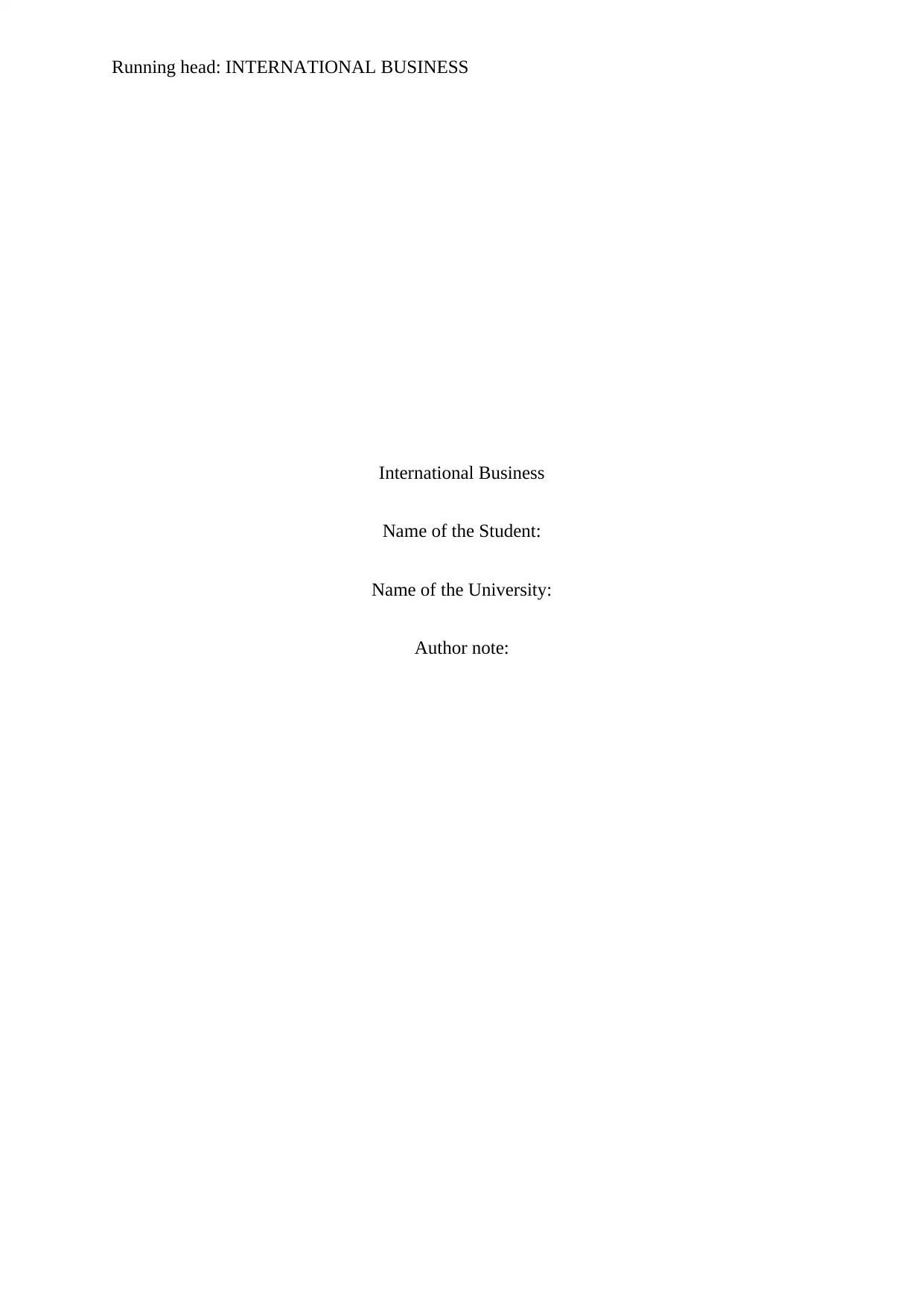
Running head: INTERNATIONAL BUSINESS
International Business
Name of the Student:
Name of the University:
Author note:
International Business
Name of the Student:
Name of the University:
Author note:
Paraphrase This Document
Need a fresh take? Get an instant paraphrase of this document with our AI Paraphraser
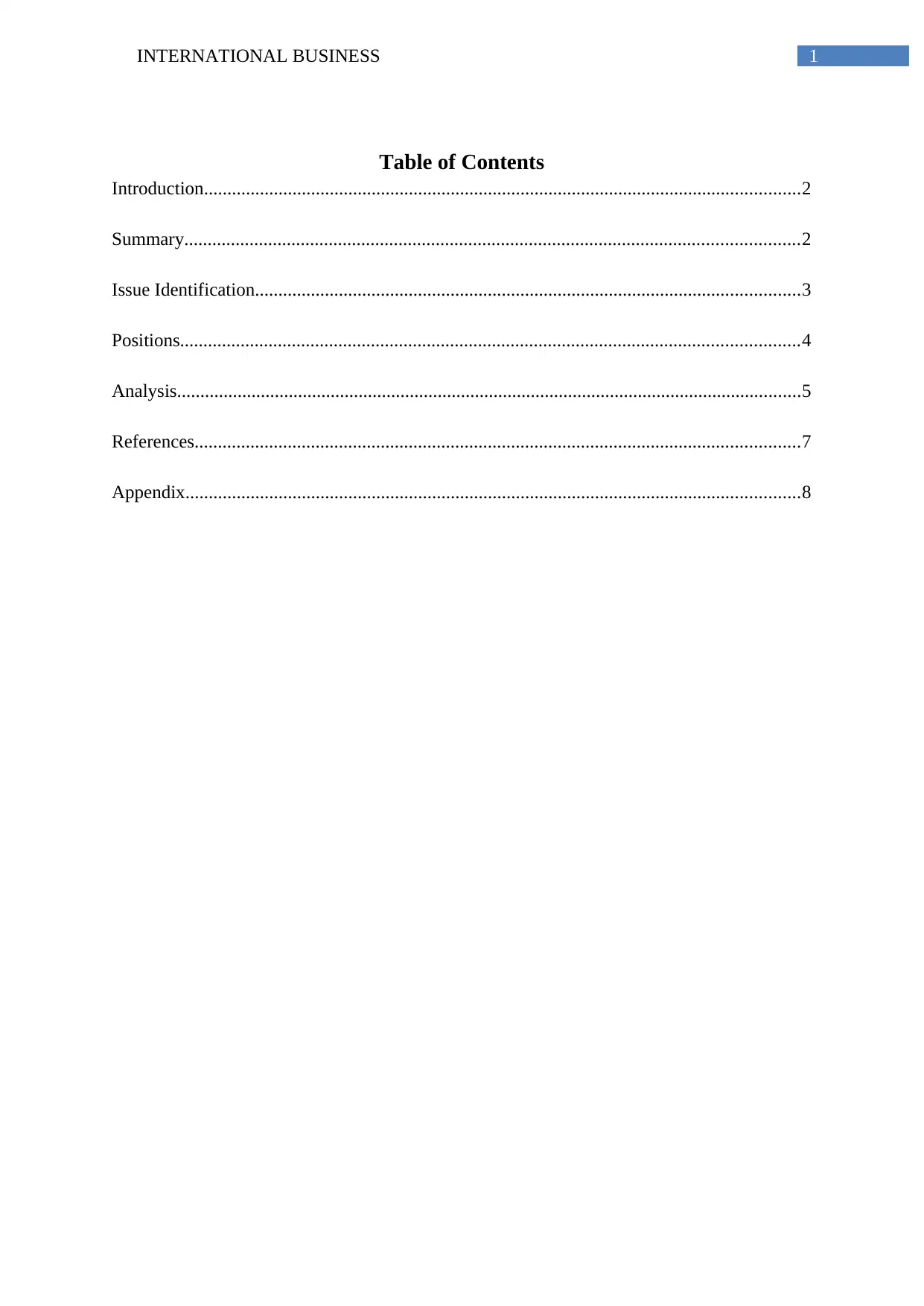
1INTERNATIONAL BUSINESS
Table of Contents
Introduction................................................................................................................................2
Summary....................................................................................................................................2
Issue Identification.....................................................................................................................3
Positions.....................................................................................................................................4
Analysis......................................................................................................................................5
References..................................................................................................................................7
Appendix....................................................................................................................................8
Table of Contents
Introduction................................................................................................................................2
Summary....................................................................................................................................2
Issue Identification.....................................................................................................................3
Positions.....................................................................................................................................4
Analysis......................................................................................................................................5
References..................................................................................................................................7
Appendix....................................................................................................................................8
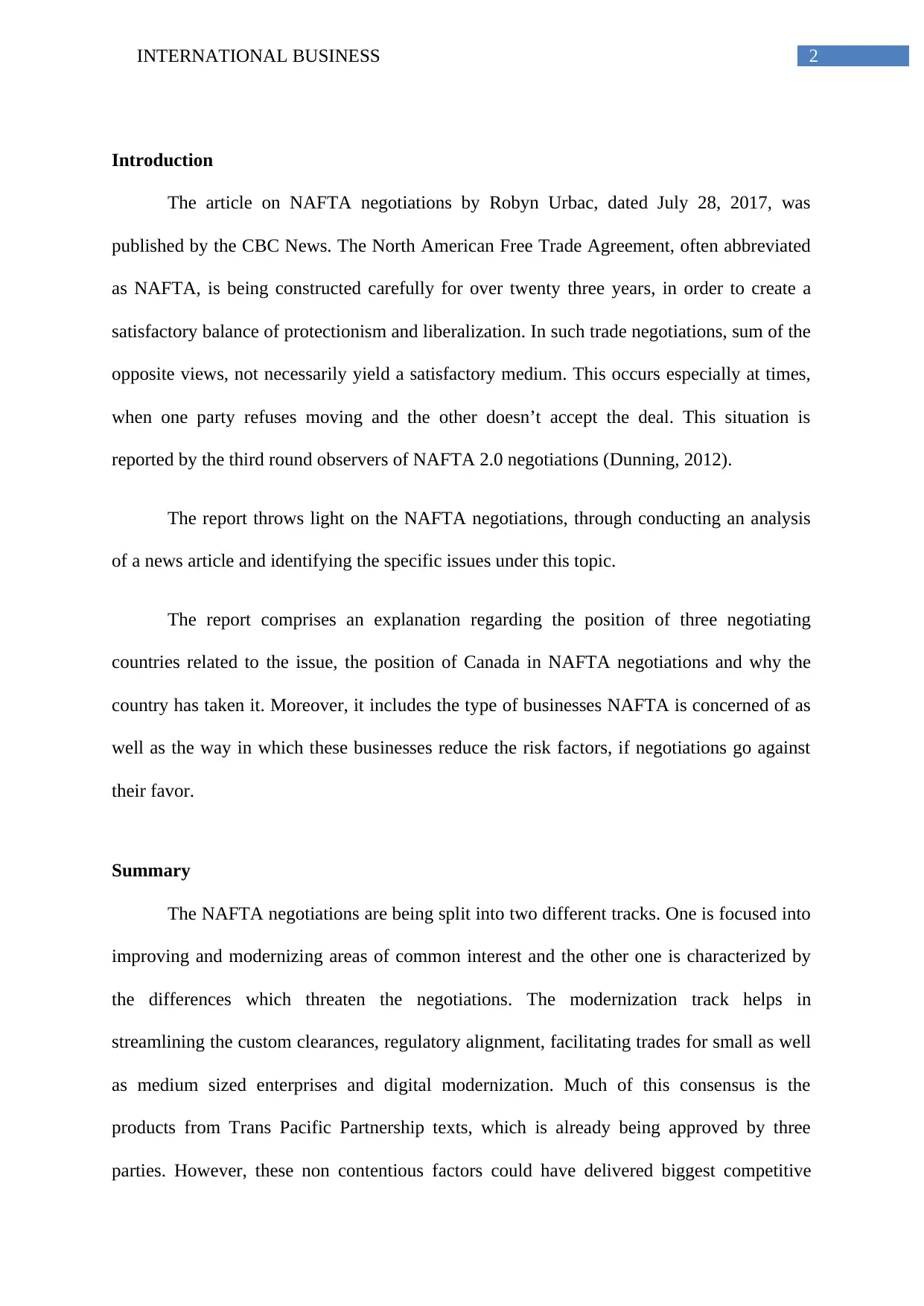
2INTERNATIONAL BUSINESS
Introduction
The article on NAFTA negotiations by Robyn Urbac, dated July 28, 2017, was
published by the CBC News. The North American Free Trade Agreement, often abbreviated
as NAFTA, is being constructed carefully for over twenty three years, in order to create a
satisfactory balance of protectionism and liberalization. In such trade negotiations, sum of the
opposite views, not necessarily yield a satisfactory medium. This occurs especially at times,
when one party refuses moving and the other doesn’t accept the deal. This situation is
reported by the third round observers of NAFTA 2.0 negotiations (Dunning, 2012).
The report throws light on the NAFTA negotiations, through conducting an analysis
of a news article and identifying the specific issues under this topic.
The report comprises an explanation regarding the position of three negotiating
countries related to the issue, the position of Canada in NAFTA negotiations and why the
country has taken it. Moreover, it includes the type of businesses NAFTA is concerned of as
well as the way in which these businesses reduce the risk factors, if negotiations go against
their favor.
Summary
The NAFTA negotiations are being split into two different tracks. One is focused into
improving and modernizing areas of common interest and the other one is characterized by
the differences which threaten the negotiations. The modernization track helps in
streamlining the custom clearances, regulatory alignment, facilitating trades for small as well
as medium sized enterprises and digital modernization. Much of this consensus is the
products from Trans Pacific Partnership texts, which is already being approved by three
parties. However, these non contentious factors could have delivered biggest competitive
Introduction
The article on NAFTA negotiations by Robyn Urbac, dated July 28, 2017, was
published by the CBC News. The North American Free Trade Agreement, often abbreviated
as NAFTA, is being constructed carefully for over twenty three years, in order to create a
satisfactory balance of protectionism and liberalization. In such trade negotiations, sum of the
opposite views, not necessarily yield a satisfactory medium. This occurs especially at times,
when one party refuses moving and the other doesn’t accept the deal. This situation is
reported by the third round observers of NAFTA 2.0 negotiations (Dunning, 2012).
The report throws light on the NAFTA negotiations, through conducting an analysis
of a news article and identifying the specific issues under this topic.
The report comprises an explanation regarding the position of three negotiating
countries related to the issue, the position of Canada in NAFTA negotiations and why the
country has taken it. Moreover, it includes the type of businesses NAFTA is concerned of as
well as the way in which these businesses reduce the risk factors, if negotiations go against
their favor.
Summary
The NAFTA negotiations are being split into two different tracks. One is focused into
improving and modernizing areas of common interest and the other one is characterized by
the differences which threaten the negotiations. The modernization track helps in
streamlining the custom clearances, regulatory alignment, facilitating trades for small as well
as medium sized enterprises and digital modernization. Much of this consensus is the
products from Trans Pacific Partnership texts, which is already being approved by three
parties. However, these non contentious factors could have delivered biggest competitive
⊘ This is a preview!⊘
Do you want full access?
Subscribe today to unlock all pages.

Trusted by 1+ million students worldwide
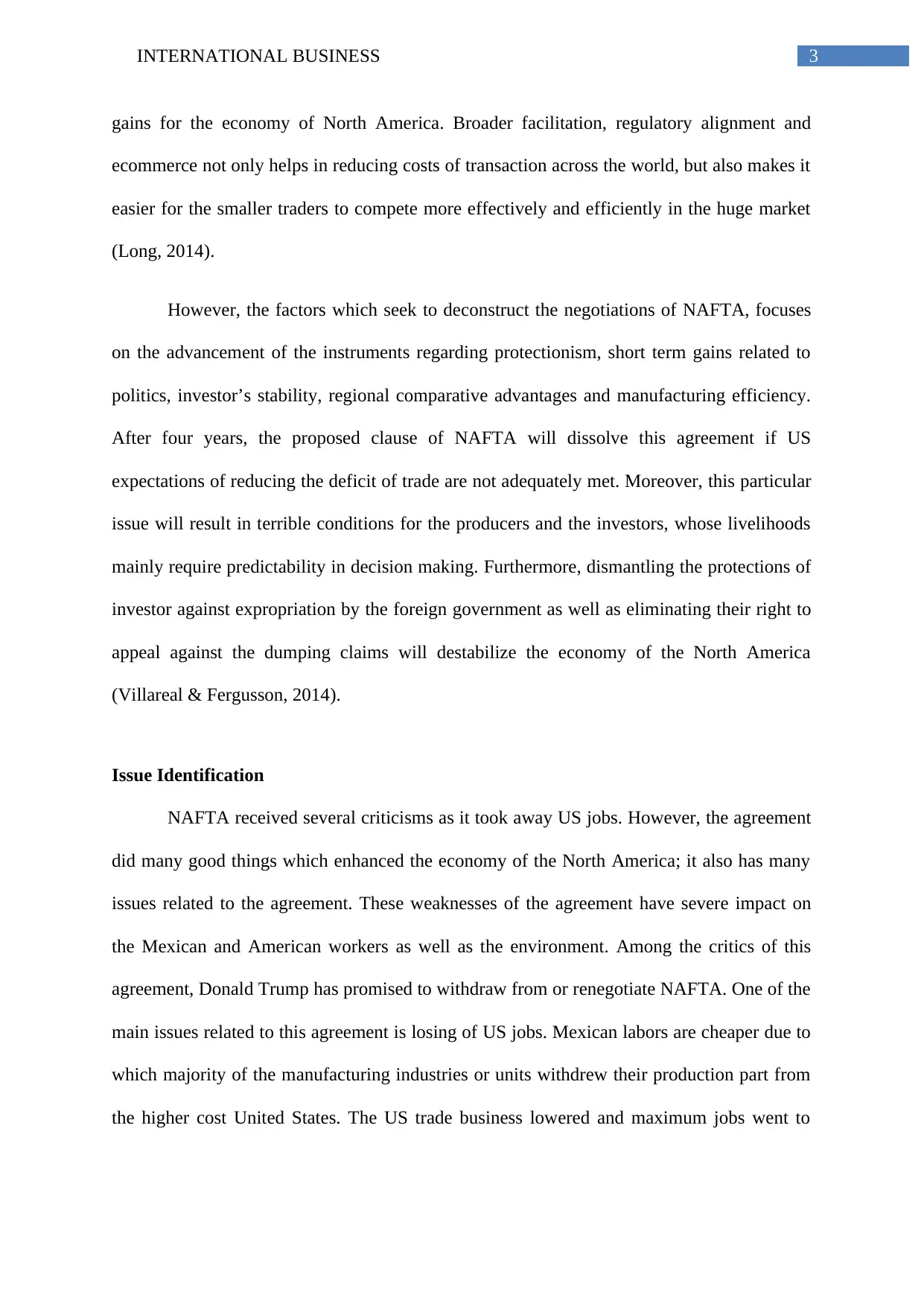
3INTERNATIONAL BUSINESS
gains for the economy of North America. Broader facilitation, regulatory alignment and
ecommerce not only helps in reducing costs of transaction across the world, but also makes it
easier for the smaller traders to compete more effectively and efficiently in the huge market
(Long, 2014).
However, the factors which seek to deconstruct the negotiations of NAFTA, focuses
on the advancement of the instruments regarding protectionism, short term gains related to
politics, investor’s stability, regional comparative advantages and manufacturing efficiency.
After four years, the proposed clause of NAFTA will dissolve this agreement if US
expectations of reducing the deficit of trade are not adequately met. Moreover, this particular
issue will result in terrible conditions for the producers and the investors, whose livelihoods
mainly require predictability in decision making. Furthermore, dismantling the protections of
investor against expropriation by the foreign government as well as eliminating their right to
appeal against the dumping claims will destabilize the economy of the North America
(Villareal & Fergusson, 2014).
Issue Identification
NAFTA received several criticisms as it took away US jobs. However, the agreement
did many good things which enhanced the economy of the North America; it also has many
issues related to the agreement. These weaknesses of the agreement have severe impact on
the Mexican and American workers as well as the environment. Among the critics of this
agreement, Donald Trump has promised to withdraw from or renegotiate NAFTA. One of the
main issues related to this agreement is losing of US jobs. Mexican labors are cheaper due to
which majority of the manufacturing industries or units withdrew their production part from
the higher cost United States. The US trade business lowered and maximum jobs went to
gains for the economy of North America. Broader facilitation, regulatory alignment and
ecommerce not only helps in reducing costs of transaction across the world, but also makes it
easier for the smaller traders to compete more effectively and efficiently in the huge market
(Long, 2014).
However, the factors which seek to deconstruct the negotiations of NAFTA, focuses
on the advancement of the instruments regarding protectionism, short term gains related to
politics, investor’s stability, regional comparative advantages and manufacturing efficiency.
After four years, the proposed clause of NAFTA will dissolve this agreement if US
expectations of reducing the deficit of trade are not adequately met. Moreover, this particular
issue will result in terrible conditions for the producers and the investors, whose livelihoods
mainly require predictability in decision making. Furthermore, dismantling the protections of
investor against expropriation by the foreign government as well as eliminating their right to
appeal against the dumping claims will destabilize the economy of the North America
(Villareal & Fergusson, 2014).
Issue Identification
NAFTA received several criticisms as it took away US jobs. However, the agreement
did many good things which enhanced the economy of the North America; it also has many
issues related to the agreement. These weaknesses of the agreement have severe impact on
the Mexican and American workers as well as the environment. Among the critics of this
agreement, Donald Trump has promised to withdraw from or renegotiate NAFTA. One of the
main issues related to this agreement is losing of US jobs. Mexican labors are cheaper due to
which majority of the manufacturing industries or units withdrew their production part from
the higher cost United States. The US trade business lowered and maximum jobs went to
Paraphrase This Document
Need a fresh take? Get an instant paraphrase of this document with our AI Paraphraser
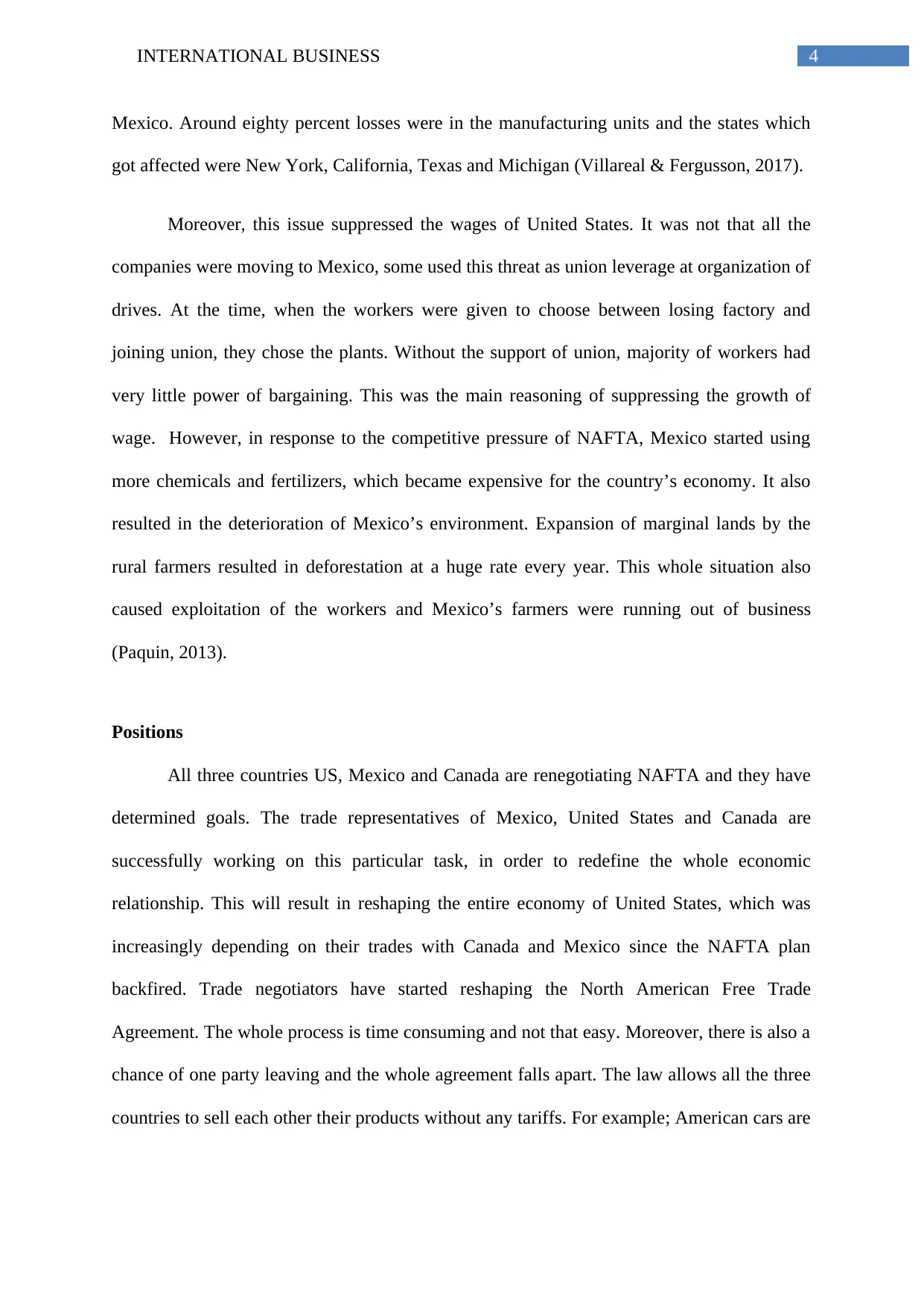
4INTERNATIONAL BUSINESS
Mexico. Around eighty percent losses were in the manufacturing units and the states which
got affected were New York, California, Texas and Michigan (Villareal & Fergusson, 2017).
Moreover, this issue suppressed the wages of United States. It was not that all the
companies were moving to Mexico, some used this threat as union leverage at organization of
drives. At the time, when the workers were given to choose between losing factory and
joining union, they chose the plants. Without the support of union, majority of workers had
very little power of bargaining. This was the main reasoning of suppressing the growth of
wage. However, in response to the competitive pressure of NAFTA, Mexico started using
more chemicals and fertilizers, which became expensive for the country’s economy. It also
resulted in the deterioration of Mexico’s environment. Expansion of marginal lands by the
rural farmers resulted in deforestation at a huge rate every year. This whole situation also
caused exploitation of the workers and Mexico’s farmers were running out of business
(Paquin, 2013).
Positions
All three countries US, Mexico and Canada are renegotiating NAFTA and they have
determined goals. The trade representatives of Mexico, United States and Canada are
successfully working on this particular task, in order to redefine the whole economic
relationship. This will result in reshaping the entire economy of United States, which was
increasingly depending on their trades with Canada and Mexico since the NAFTA plan
backfired. Trade negotiators have started reshaping the North American Free Trade
Agreement. The whole process is time consuming and not that easy. Moreover, there is also a
chance of one party leaving and the whole agreement falls apart. The law allows all the three
countries to sell each other their products without any tariffs. For example; American cars are
Mexico. Around eighty percent losses were in the manufacturing units and the states which
got affected were New York, California, Texas and Michigan (Villareal & Fergusson, 2017).
Moreover, this issue suppressed the wages of United States. It was not that all the
companies were moving to Mexico, some used this threat as union leverage at organization of
drives. At the time, when the workers were given to choose between losing factory and
joining union, they chose the plants. Without the support of union, majority of workers had
very little power of bargaining. This was the main reasoning of suppressing the growth of
wage. However, in response to the competitive pressure of NAFTA, Mexico started using
more chemicals and fertilizers, which became expensive for the country’s economy. It also
resulted in the deterioration of Mexico’s environment. Expansion of marginal lands by the
rural farmers resulted in deforestation at a huge rate every year. This whole situation also
caused exploitation of the workers and Mexico’s farmers were running out of business
(Paquin, 2013).
Positions
All three countries US, Mexico and Canada are renegotiating NAFTA and they have
determined goals. The trade representatives of Mexico, United States and Canada are
successfully working on this particular task, in order to redefine the whole economic
relationship. This will result in reshaping the entire economy of United States, which was
increasingly depending on their trades with Canada and Mexico since the NAFTA plan
backfired. Trade negotiators have started reshaping the North American Free Trade
Agreement. The whole process is time consuming and not that easy. Moreover, there is also a
chance of one party leaving and the whole agreement falls apart. The law allows all the three
countries to sell each other their products without any tariffs. For example; American cars are
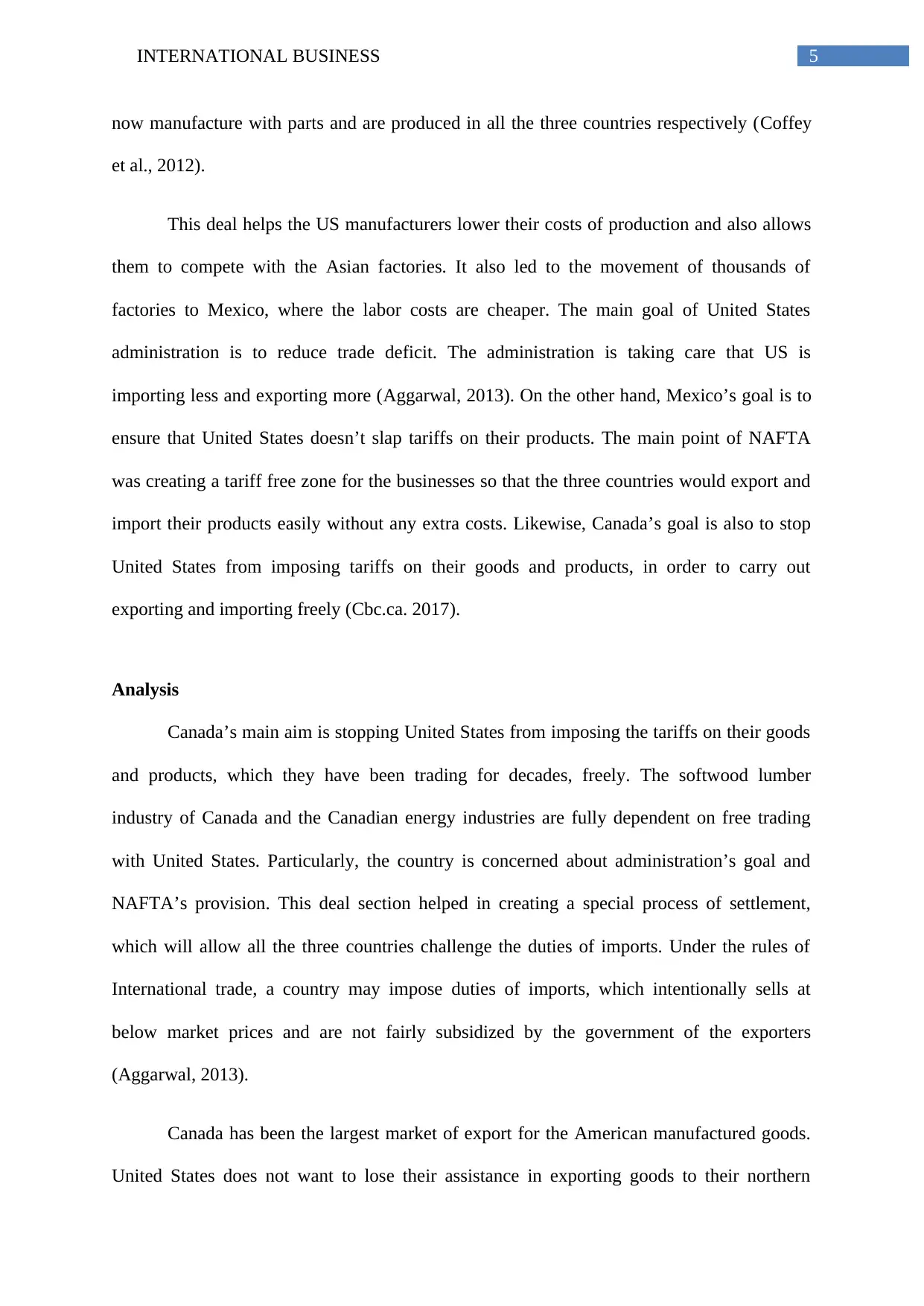
5INTERNATIONAL BUSINESS
now manufacture with parts and are produced in all the three countries respectively (Coffey
et al., 2012).
This deal helps the US manufacturers lower their costs of production and also allows
them to compete with the Asian factories. It also led to the movement of thousands of
factories to Mexico, where the labor costs are cheaper. The main goal of United States
administration is to reduce trade deficit. The administration is taking care that US is
importing less and exporting more (Aggarwal, 2013). On the other hand, Mexico’s goal is to
ensure that United States doesn’t slap tariffs on their products. The main point of NAFTA
was creating a tariff free zone for the businesses so that the three countries would export and
import their products easily without any extra costs. Likewise, Canada’s goal is also to stop
United States from imposing tariffs on their goods and products, in order to carry out
exporting and importing freely (Cbc.ca. 2017).
Analysis
Canada’s main aim is stopping United States from imposing the tariffs on their goods
and products, which they have been trading for decades, freely. The softwood lumber
industry of Canada and the Canadian energy industries are fully dependent on free trading
with United States. Particularly, the country is concerned about administration’s goal and
NAFTA’s provision. This deal section helped in creating a special process of settlement,
which will allow all the three countries challenge the duties of imports. Under the rules of
International trade, a country may impose duties of imports, which intentionally sells at
below market prices and are not fairly subsidized by the government of the exporters
(Aggarwal, 2013).
Canada has been the largest market of export for the American manufactured goods.
United States does not want to lose their assistance in exporting goods to their northern
now manufacture with parts and are produced in all the three countries respectively (Coffey
et al., 2012).
This deal helps the US manufacturers lower their costs of production and also allows
them to compete with the Asian factories. It also led to the movement of thousands of
factories to Mexico, where the labor costs are cheaper. The main goal of United States
administration is to reduce trade deficit. The administration is taking care that US is
importing less and exporting more (Aggarwal, 2013). On the other hand, Mexico’s goal is to
ensure that United States doesn’t slap tariffs on their products. The main point of NAFTA
was creating a tariff free zone for the businesses so that the three countries would export and
import their products easily without any extra costs. Likewise, Canada’s goal is also to stop
United States from imposing tariffs on their goods and products, in order to carry out
exporting and importing freely (Cbc.ca. 2017).
Analysis
Canada’s main aim is stopping United States from imposing the tariffs on their goods
and products, which they have been trading for decades, freely. The softwood lumber
industry of Canada and the Canadian energy industries are fully dependent on free trading
with United States. Particularly, the country is concerned about administration’s goal and
NAFTA’s provision. This deal section helped in creating a special process of settlement,
which will allow all the three countries challenge the duties of imports. Under the rules of
International trade, a country may impose duties of imports, which intentionally sells at
below market prices and are not fairly subsidized by the government of the exporters
(Aggarwal, 2013).
Canada has been the largest market of export for the American manufactured goods.
United States does not want to lose their assistance in exporting goods to their northern
⊘ This is a preview!⊘
Do you want full access?
Subscribe today to unlock all pages.

Trusted by 1+ million students worldwide
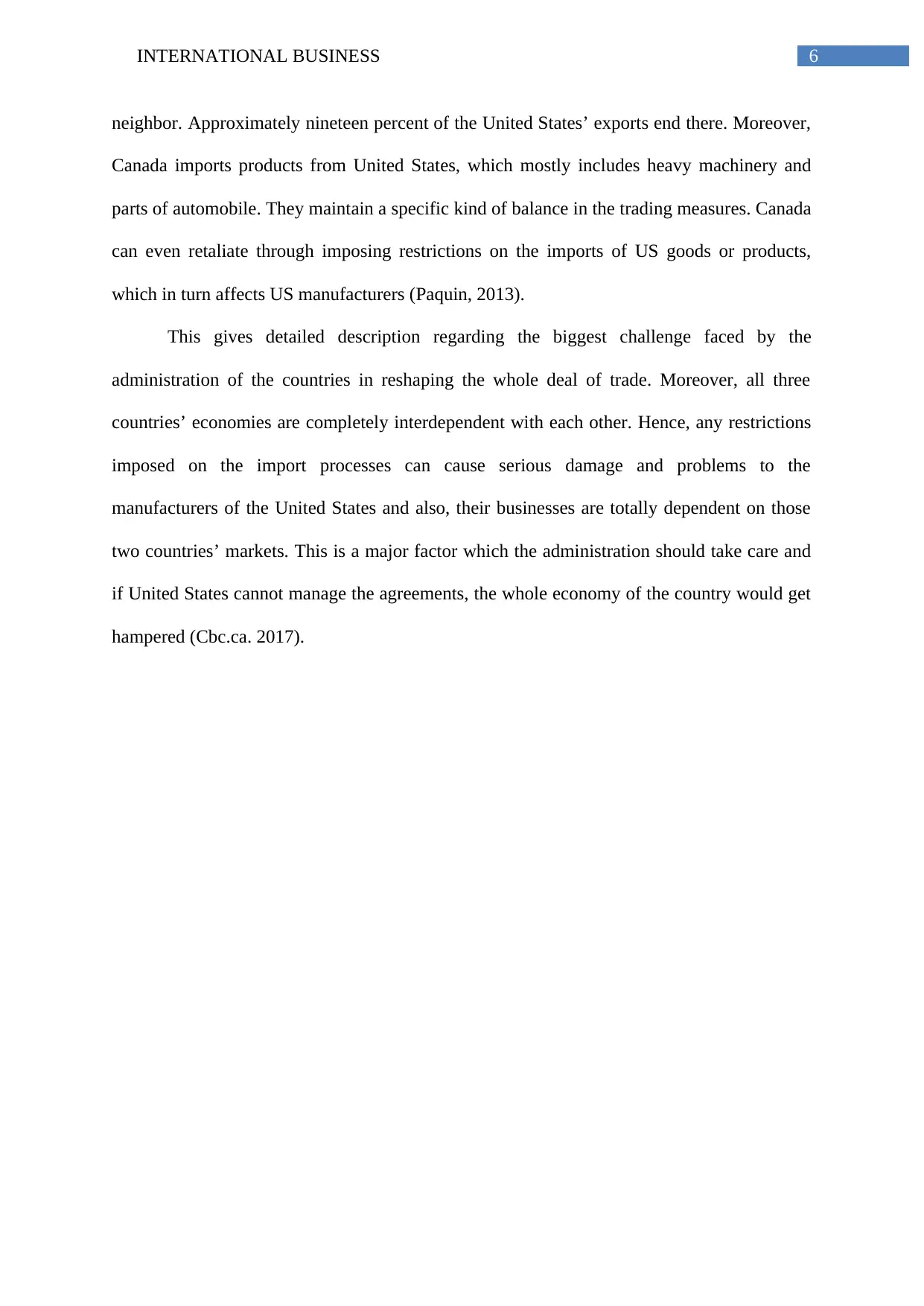
6INTERNATIONAL BUSINESS
neighbor. Approximately nineteen percent of the United States’ exports end there. Moreover,
Canada imports products from United States, which mostly includes heavy machinery and
parts of automobile. They maintain a specific kind of balance in the trading measures. Canada
can even retaliate through imposing restrictions on the imports of US goods or products,
which in turn affects US manufacturers (Paquin, 2013).
This gives detailed description regarding the biggest challenge faced by the
administration of the countries in reshaping the whole deal of trade. Moreover, all three
countries’ economies are completely interdependent with each other. Hence, any restrictions
imposed on the import processes can cause serious damage and problems to the
manufacturers of the United States and also, their businesses are totally dependent on those
two countries’ markets. This is a major factor which the administration should take care and
if United States cannot manage the agreements, the whole economy of the country would get
hampered (Cbc.ca. 2017).
neighbor. Approximately nineteen percent of the United States’ exports end there. Moreover,
Canada imports products from United States, which mostly includes heavy machinery and
parts of automobile. They maintain a specific kind of balance in the trading measures. Canada
can even retaliate through imposing restrictions on the imports of US goods or products,
which in turn affects US manufacturers (Paquin, 2013).
This gives detailed description regarding the biggest challenge faced by the
administration of the countries in reshaping the whole deal of trade. Moreover, all three
countries’ economies are completely interdependent with each other. Hence, any restrictions
imposed on the import processes can cause serious damage and problems to the
manufacturers of the United States and also, their businesses are totally dependent on those
two countries’ markets. This is a major factor which the administration should take care and
if United States cannot manage the agreements, the whole economy of the country would get
hampered (Cbc.ca. 2017).
Paraphrase This Document
Need a fresh take? Get an instant paraphrase of this document with our AI Paraphraser
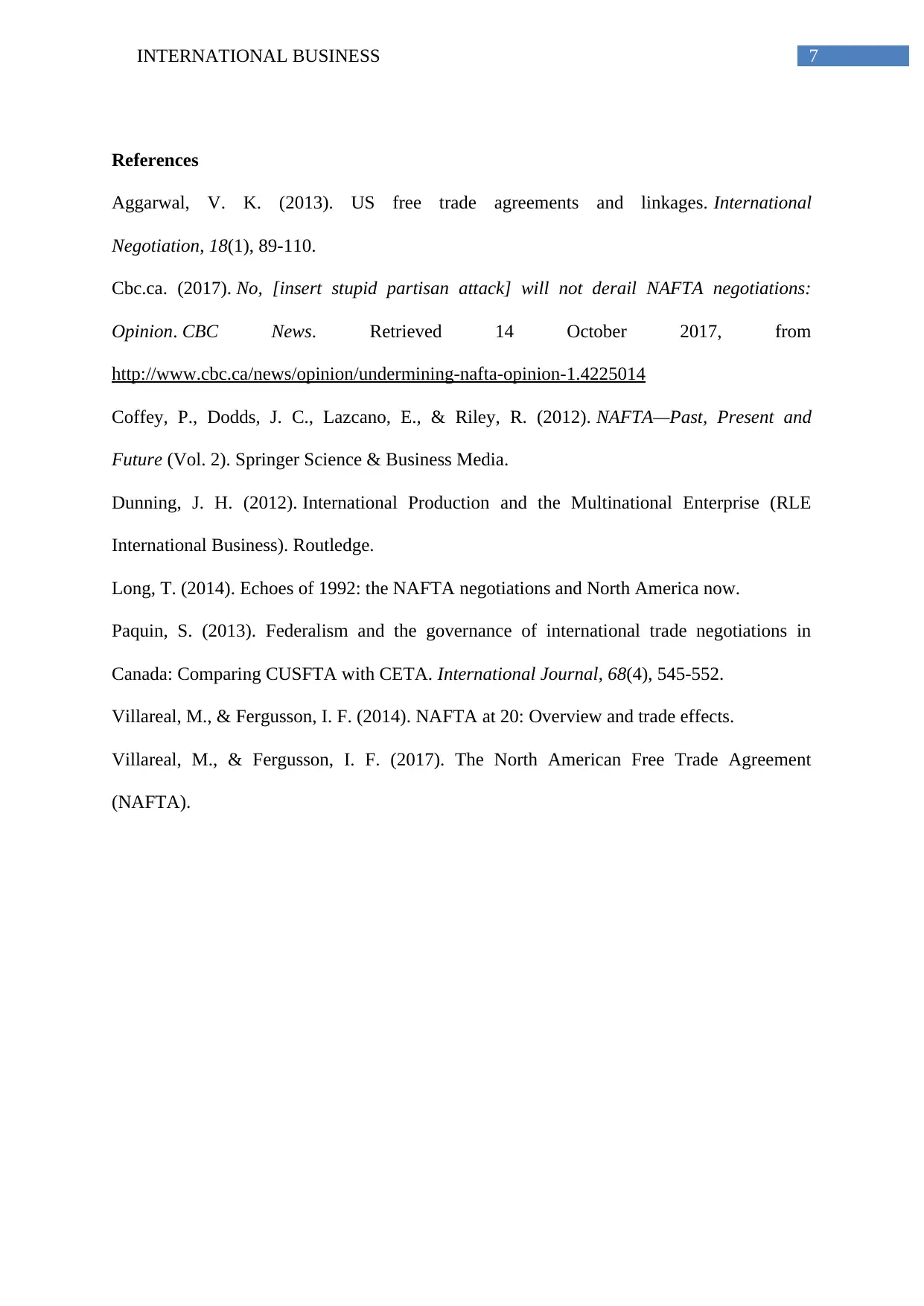
7INTERNATIONAL BUSINESS
References
Aggarwal, V. K. (2013). US free trade agreements and linkages. International
Negotiation, 18(1), 89-110.
Cbc.ca. (2017). No, [insert stupid partisan attack] will not derail NAFTA negotiations:
Opinion. CBC News. Retrieved 14 October 2017, from
http://www.cbc.ca/news/opinion/undermining-nafta-opinion-1.4225014
Coffey, P., Dodds, J. C., Lazcano, E., & Riley, R. (2012). NAFTA—Past, Present and
Future (Vol. 2). Springer Science & Business Media.
Dunning, J. H. (2012). International Production and the Multinational Enterprise (RLE
International Business). Routledge.
Long, T. (2014). Echoes of 1992: the NAFTA negotiations and North America now.
Paquin, S. (2013). Federalism and the governance of international trade negotiations in
Canada: Comparing CUSFTA with CETA. International Journal, 68(4), 545-552.
Villareal, M., & Fergusson, I. F. (2014). NAFTA at 20: Overview and trade effects.
Villareal, M., & Fergusson, I. F. (2017). The North American Free Trade Agreement
(NAFTA).
References
Aggarwal, V. K. (2013). US free trade agreements and linkages. International
Negotiation, 18(1), 89-110.
Cbc.ca. (2017). No, [insert stupid partisan attack] will not derail NAFTA negotiations:
Opinion. CBC News. Retrieved 14 October 2017, from
http://www.cbc.ca/news/opinion/undermining-nafta-opinion-1.4225014
Coffey, P., Dodds, J. C., Lazcano, E., & Riley, R. (2012). NAFTA—Past, Present and
Future (Vol. 2). Springer Science & Business Media.
Dunning, J. H. (2012). International Production and the Multinational Enterprise (RLE
International Business). Routledge.
Long, T. (2014). Echoes of 1992: the NAFTA negotiations and North America now.
Paquin, S. (2013). Federalism and the governance of international trade negotiations in
Canada: Comparing CUSFTA with CETA. International Journal, 68(4), 545-552.
Villareal, M., & Fergusson, I. F. (2014). NAFTA at 20: Overview and trade effects.
Villareal, M., & Fergusson, I. F. (2017). The North American Free Trade Agreement
(NAFTA).
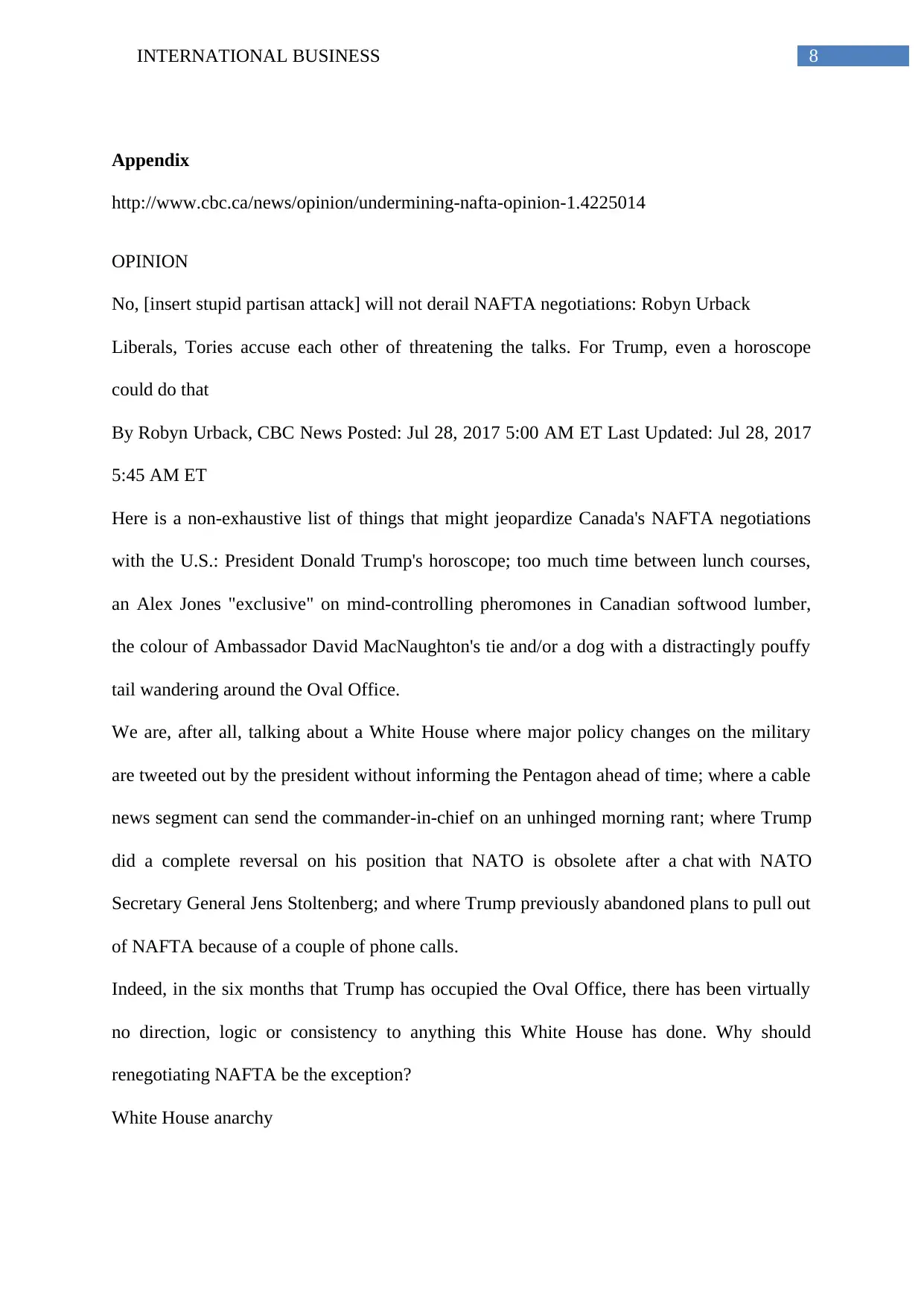
8INTERNATIONAL BUSINESS
Appendix
http://www.cbc.ca/news/opinion/undermining-nafta-opinion-1.4225014
OPINION
No, [insert stupid partisan attack] will not derail NAFTA negotiations: Robyn Urback
Liberals, Tories accuse each other of threatening the talks. For Trump, even a horoscope
could do that
By Robyn Urback, CBC News Posted: Jul 28, 2017 5:00 AM ET Last Updated: Jul 28, 2017
5:45 AM ET
Here is a non-exhaustive list of things that might jeopardize Canada's NAFTA negotiations
with the U.S.: President Donald Trump's horoscope; too much time between lunch courses,
an Alex Jones "exclusive" on mind-controlling pheromones in Canadian softwood lumber,
the colour of Ambassador David MacNaughton's tie and/or a dog with a distractingly pouffy
tail wandering around the Oval Office.
We are, after all, talking about a White House where major policy changes on the military
are tweeted out by the president without informing the Pentagon ahead of time; where a cable
news segment can send the commander-in-chief on an unhinged morning rant; where Trump
did a complete reversal on his position that NATO is obsolete after a chat with NATO
Secretary General Jens Stoltenberg; and where Trump previously abandoned plans to pull out
of NAFTA because of a couple of phone calls.
Indeed, in the six months that Trump has occupied the Oval Office, there has been virtually
no direction, logic or consistency to anything this White House has done. Why should
renegotiating NAFTA be the exception?
White House anarchy
Appendix
http://www.cbc.ca/news/opinion/undermining-nafta-opinion-1.4225014
OPINION
No, [insert stupid partisan attack] will not derail NAFTA negotiations: Robyn Urback
Liberals, Tories accuse each other of threatening the talks. For Trump, even a horoscope
could do that
By Robyn Urback, CBC News Posted: Jul 28, 2017 5:00 AM ET Last Updated: Jul 28, 2017
5:45 AM ET
Here is a non-exhaustive list of things that might jeopardize Canada's NAFTA negotiations
with the U.S.: President Donald Trump's horoscope; too much time between lunch courses,
an Alex Jones "exclusive" on mind-controlling pheromones in Canadian softwood lumber,
the colour of Ambassador David MacNaughton's tie and/or a dog with a distractingly pouffy
tail wandering around the Oval Office.
We are, after all, talking about a White House where major policy changes on the military
are tweeted out by the president without informing the Pentagon ahead of time; where a cable
news segment can send the commander-in-chief on an unhinged morning rant; where Trump
did a complete reversal on his position that NATO is obsolete after a chat with NATO
Secretary General Jens Stoltenberg; and where Trump previously abandoned plans to pull out
of NAFTA because of a couple of phone calls.
Indeed, in the six months that Trump has occupied the Oval Office, there has been virtually
no direction, logic or consistency to anything this White House has done. Why should
renegotiating NAFTA be the exception?
White House anarchy
⊘ This is a preview!⊘
Do you want full access?
Subscribe today to unlock all pages.

Trusted by 1+ million students worldwide
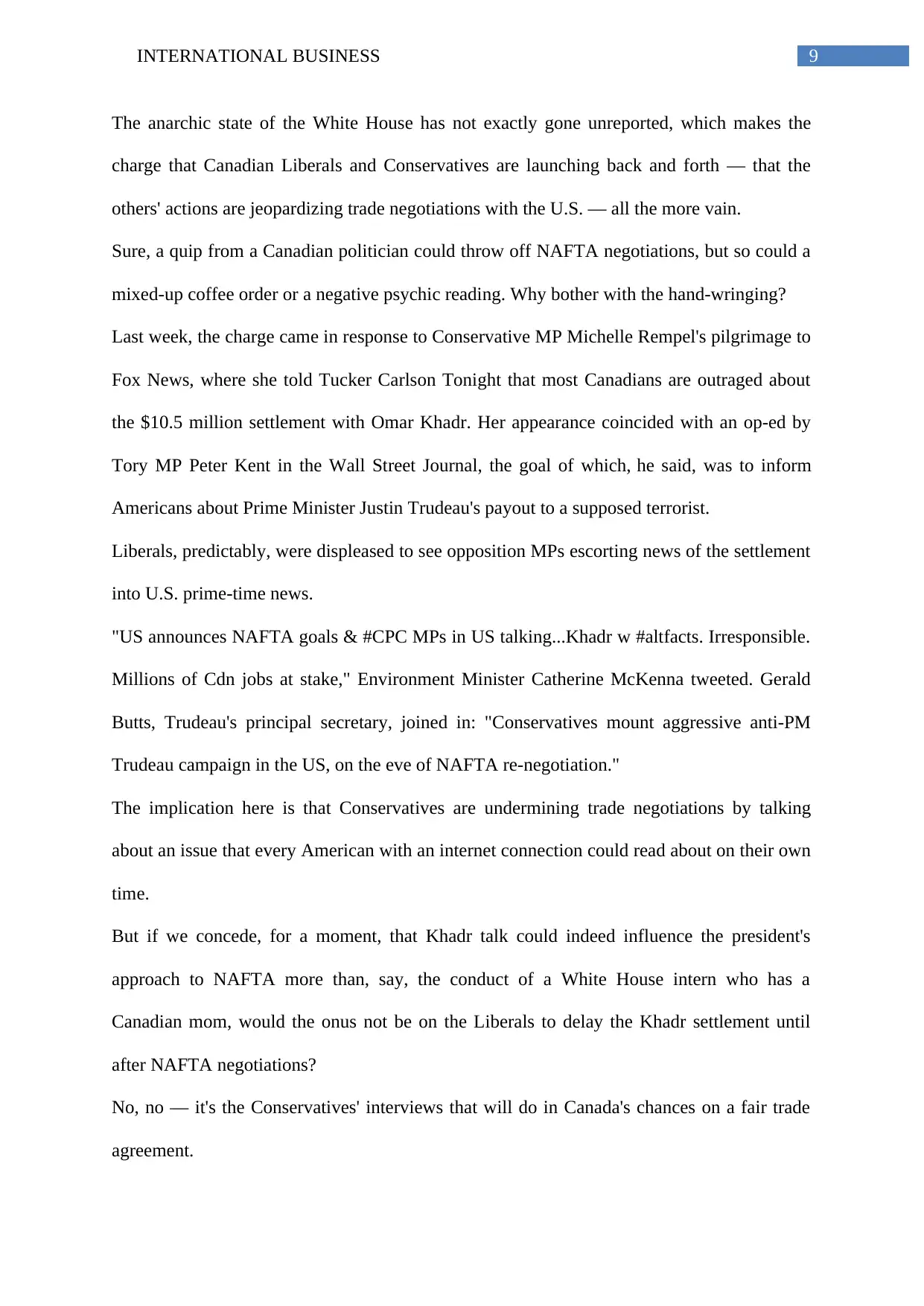
9INTERNATIONAL BUSINESS
The anarchic state of the White House has not exactly gone unreported, which makes the
charge that Canadian Liberals and Conservatives are launching back and forth — that the
others' actions are jeopardizing trade negotiations with the U.S. — all the more vain.
Sure, a quip from a Canadian politician could throw off NAFTA negotiations, but so could a
mixed-up coffee order or a negative psychic reading. Why bother with the hand-wringing?
Last week, the charge came in response to Conservative MP Michelle Rempel's pilgrimage to
Fox News, where she told Tucker Carlson Tonight that most Canadians are outraged about
the $10.5 million settlement with Omar Khadr. Her appearance coincided with an op-ed by
Tory MP Peter Kent in the Wall Street Journal, the goal of which, he said, was to inform
Americans about Prime Minister Justin Trudeau's payout to a supposed terrorist.
Liberals, predictably, were displeased to see opposition MPs escorting news of the settlement
into U.S. prime-time news.
"US announces NAFTA goals & #CPC MPs in US talking...Khadr w #altfacts. Irresponsible.
Millions of Cdn jobs at stake," Environment Minister Catherine McKenna tweeted. Gerald
Butts, Trudeau's principal secretary, joined in: "Conservatives mount aggressive anti-PM
Trudeau campaign in the US, on the eve of NAFTA re-negotiation."
The implication here is that Conservatives are undermining trade negotiations by talking
about an issue that every American with an internet connection could read about on their own
time.
But if we concede, for a moment, that Khadr talk could indeed influence the president's
approach to NAFTA more than, say, the conduct of a White House intern who has a
Canadian mom, would the onus not be on the Liberals to delay the Khadr settlement until
after NAFTA negotiations?
No, no — it's the Conservatives' interviews that will do in Canada's chances on a fair trade
agreement.
The anarchic state of the White House has not exactly gone unreported, which makes the
charge that Canadian Liberals and Conservatives are launching back and forth — that the
others' actions are jeopardizing trade negotiations with the U.S. — all the more vain.
Sure, a quip from a Canadian politician could throw off NAFTA negotiations, but so could a
mixed-up coffee order or a negative psychic reading. Why bother with the hand-wringing?
Last week, the charge came in response to Conservative MP Michelle Rempel's pilgrimage to
Fox News, where she told Tucker Carlson Tonight that most Canadians are outraged about
the $10.5 million settlement with Omar Khadr. Her appearance coincided with an op-ed by
Tory MP Peter Kent in the Wall Street Journal, the goal of which, he said, was to inform
Americans about Prime Minister Justin Trudeau's payout to a supposed terrorist.
Liberals, predictably, were displeased to see opposition MPs escorting news of the settlement
into U.S. prime-time news.
"US announces NAFTA goals & #CPC MPs in US talking...Khadr w #altfacts. Irresponsible.
Millions of Cdn jobs at stake," Environment Minister Catherine McKenna tweeted. Gerald
Butts, Trudeau's principal secretary, joined in: "Conservatives mount aggressive anti-PM
Trudeau campaign in the US, on the eve of NAFTA re-negotiation."
The implication here is that Conservatives are undermining trade negotiations by talking
about an issue that every American with an internet connection could read about on their own
time.
But if we concede, for a moment, that Khadr talk could indeed influence the president's
approach to NAFTA more than, say, the conduct of a White House intern who has a
Canadian mom, would the onus not be on the Liberals to delay the Khadr settlement until
after NAFTA negotiations?
No, no — it's the Conservatives' interviews that will do in Canada's chances on a fair trade
agreement.
Paraphrase This Document
Need a fresh take? Get an instant paraphrase of this document with our AI Paraphraser
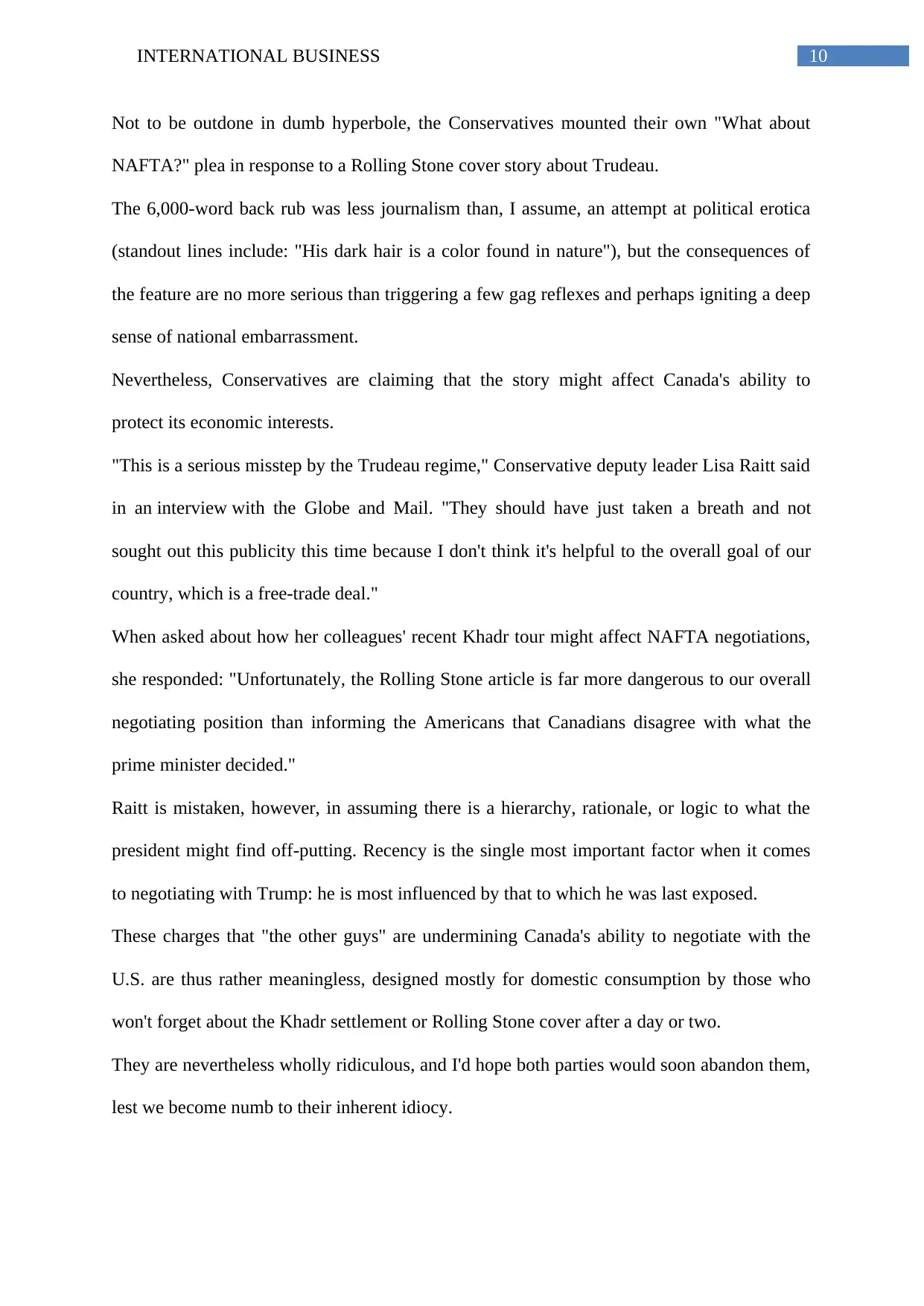
10INTERNATIONAL BUSINESS
Not to be outdone in dumb hyperbole, the Conservatives mounted their own "What about
NAFTA?" plea in response to a Rolling Stone cover story about Trudeau.
The 6,000-word back rub was less journalism than, I assume, an attempt at political erotica
(standout lines include: "His dark hair is a color found in nature"), but the consequences of
the feature are no more serious than triggering a few gag reflexes and perhaps igniting a deep
sense of national embarrassment.
Nevertheless, Conservatives are claiming that the story might affect Canada's ability to
protect its economic interests.
"This is a serious misstep by the Trudeau regime," Conservative deputy leader Lisa Raitt said
in an interview with the Globe and Mail. "They should have just taken a breath and not
sought out this publicity this time because I don't think it's helpful to the overall goal of our
country, which is a free-trade deal."
When asked about how her colleagues' recent Khadr tour might affect NAFTA negotiations,
she responded: "Unfortunately, the Rolling Stone article is far more dangerous to our overall
negotiating position than informing the Americans that Canadians disagree with what the
prime minister decided."
Raitt is mistaken, however, in assuming there is a hierarchy, rationale, or logic to what the
president might find off-putting. Recency is the single most important factor when it comes
to negotiating with Trump: he is most influenced by that to which he was last exposed.
These charges that "the other guys" are undermining Canada's ability to negotiate with the
U.S. are thus rather meaningless, designed mostly for domestic consumption by those who
won't forget about the Khadr settlement or Rolling Stone cover after a day or two.
They are nevertheless wholly ridiculous, and I'd hope both parties would soon abandon them,
lest we become numb to their inherent idiocy.
Not to be outdone in dumb hyperbole, the Conservatives mounted their own "What about
NAFTA?" plea in response to a Rolling Stone cover story about Trudeau.
The 6,000-word back rub was less journalism than, I assume, an attempt at political erotica
(standout lines include: "His dark hair is a color found in nature"), but the consequences of
the feature are no more serious than triggering a few gag reflexes and perhaps igniting a deep
sense of national embarrassment.
Nevertheless, Conservatives are claiming that the story might affect Canada's ability to
protect its economic interests.
"This is a serious misstep by the Trudeau regime," Conservative deputy leader Lisa Raitt said
in an interview with the Globe and Mail. "They should have just taken a breath and not
sought out this publicity this time because I don't think it's helpful to the overall goal of our
country, which is a free-trade deal."
When asked about how her colleagues' recent Khadr tour might affect NAFTA negotiations,
she responded: "Unfortunately, the Rolling Stone article is far more dangerous to our overall
negotiating position than informing the Americans that Canadians disagree with what the
prime minister decided."
Raitt is mistaken, however, in assuming there is a hierarchy, rationale, or logic to what the
president might find off-putting. Recency is the single most important factor when it comes
to negotiating with Trump: he is most influenced by that to which he was last exposed.
These charges that "the other guys" are undermining Canada's ability to negotiate with the
U.S. are thus rather meaningless, designed mostly for domestic consumption by those who
won't forget about the Khadr settlement or Rolling Stone cover after a day or two.
They are nevertheless wholly ridiculous, and I'd hope both parties would soon abandon them,
lest we become numb to their inherent idiocy.
1 out of 11
Your All-in-One AI-Powered Toolkit for Academic Success.
+13062052269
info@desklib.com
Available 24*7 on WhatsApp / Email
![[object Object]](/_next/static/media/star-bottom.7253800d.svg)
Unlock your academic potential
Copyright © 2020–2026 A2Z Services. All Rights Reserved. Developed and managed by ZUCOL.


